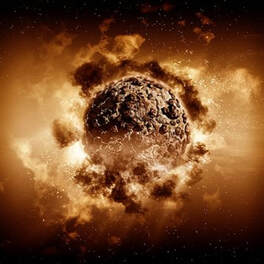|
Image designed by freepik at https://www.freepik.com/ Useage information: https://support.freepik.com/s/article/How-can-I-use-free-images?language=en_US …is the greatest science-fiction novel ever written. The concept of the book is riveting, and its language rises to literary heights. What’s it about? Well, I won’t summarize the entire story; but at the end of the book the human children of the world become non-human entities that swarm across the Earth and destroy the planet. I’ll quote one character—Jan—an adult who remains on Earth and witnesses the apocalypse:
The buildings round me, the ground, the mountains—everything’s like glass—I can see through it. Earth’s dissolving…. The light! from beneath me—inside the Earth—shining upward, through the rocks, the ground, everything—growing brighter, brighter, blinding— The author concludes this description of a cosmic transformation: In a soundless concussion of light, Earth’s core gave up it’s hoarded energies. For a little while the gravitational waves crossed and re- crossed the solar system, disturbing ever so slightly the orbits of the planets…. There was nothing left of Earth: They (the non-human children) had leeched away the last atoms of its substance. It had nourished them, through the fierce moments of their inconceivable metamorphosis, as the food stored in a grain of wheat feeds the infant plant while it climbs towards the sun. (Childhood’s End, Copyright 1953, 1981,1990, 2001 by Arthur C. Clarke, electronic edition copyright 2012 by RosettaBooks, LLC) So, what does this science-fiction scenario have to do with Quakerism? Well, as a Christian Quaker, I believe that at death we return to God. But what does that mean? Does our soul dissolve in the Divine Substance, our individual memories and personality disappearing? That would be—I think—like the metamorphing children in Clarke’s story. Or do we preserve our individuality and continue to act in freedom although transformed by the Eternal Presence? For what it’s worth, the New Testament teaches the latter idea. In this dichotomy, I opt for the latter although I freely admit there’s no scientific evidence for the idea. Still, I can’t help quoting my favorite Bible verse, 1 Corinthians 13:12: “For now we see through a glass, darkly; but then face to face: now I know in part; but then shall I know even as also I am known.” (KJV) ~ Richard Russell
0 Comments
Leave a Reply. |
This blog was set up to post content of interest to Old Chatham Quaker members and attenders. Posts related to one's own personal spiritual journey, reports based on interviews with others, and reflections on Quaker-related topics are welcome. Posts by individuals are personal expressions and do not necessarily reflect those of the Meeting as a whole.
Guidelines for posting on website blog:
Submit to member of Communications committee; committee has editorial oversight over all content posted on the Meeting website. Be respectful of the nature of vocal ministry given in Meeting for Worship or other settings and any private conversations about spiritual matters. Cite source of any image or other external content submitted. Archives
July 2024
Categories |

 RSS Feed
RSS Feed